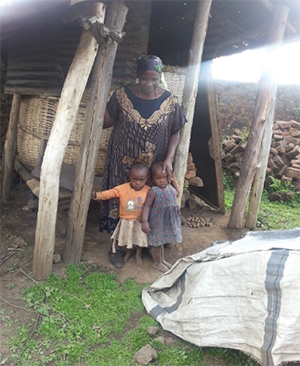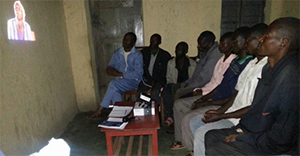
At 57 years old, Bibiana is a seasoned Village Health Team member (VHT). She has served her community for over 30 years. She is a reputable “village doctor” and the first person whose opinion new mothers seek on how to look after their newborn babies. She does not remember the number of children whose lives she has saved through treatment of diarrhea and other child illnesses. Under the Ministry of Health training and trainings conducted by implementing partners, Bibiana has learned how to assess children for acute malnutrition and refer them to the health unit.
However, in all the years she has worked and children’s lives she has touched, Bibiana had never heard of “stunting.” “For us, so long as a child is playing in the compound we assume it is fine” she said. She adds that she had excelled in identification of malnutrition cases, but realized that most of the time, the same children that had been admitted and treated, were always becoming malnourished again.
SPRING/Uganda was an answer to more problems than she had even thought her community had. In the two years she has worked with SPRING/Uganda, her capacity to reach out to mothers, and even fathers, to educate them on preventive measures to fight malnutrition has been extensively built.
Where she had previously struggled with ways to help mothers avoid re-admission into the hospital, she now has the capacity to help mothers adopt small doable actions in their households, such as exclusively breastfeeding their children for the first six months of their lives, increasing feeding for their sick and recovering children, and continued breastfeeding. This not only ensures that their children are protected against malnutrition, but also get all the nutrients that they need to grow to their maximum potential.
Bibiana says getting to know about the silent malnutrition that has gripped her community was a revelation. She now understands the need for behavior change if stunting is to be stamped out of her community and Kisoro all together. “I knew a malnourished child is one whose hair turns brown, feet swells, or is severely wasted. That a child could look normal, but when in actual sense they are malnourished because they have not grown to their full potential was astounding to me!” says Bibiana.
I knew a malnourished child is one whose hair turns brown, feet swells or is severely wasted. That a child could look normal but when in actual sense they are malnourished because they have not grown to their full potential was astounding to me!
Blessed with rich volcanic soils and rains throughout the year, Kisoro is one of the food baskets of Uganda and neighboring Rwanda. However, this lovely district is also home to thousands of stunted children. Recent studies have rated stunting in Kisoro at 51 percent. SPRING/Uganda’s goal is to reduce stunting and anemia. In the Southwest region of Uganda, the project uses social and behavior change communication to mobilize communities towards improved nutrition. SPRING/Uganda recently launched a community video campaign that targets mothers, fathers, and grandmothers of children ages 0-23 months called the “Great Mothers, Healthy Children” campaign. The project has trained 221 VHTs on how to facilitate the video sessions to community member, including 70 in Kisoro.
The videos show the small steps that other parents are taking to raise healthy children. During the video sessions, the audience shares their views on the behaviors shown. They each pose questions and find answers collectively. A VHT is their technical moderator and the commitments that they make are individual, depending on what has touched an individual.

The engagement of men who have previously left the health and care of their children to the wives alone has been noteworthy. It is especially important to engage the men since they are often the bread winners in the target communities and farming is the primary livelihood. Men determine what food is left in the house and what is sold. Engaging them and helping them realize that looking after their children is a combined effort has been a milestone.
The journey is far from over. Bibiana, like her colleagues, has a home to take care of, a garden to tend, and other household chores. She can only show these videos in her spare time. In addition, behavior change can be a slow process and patience is needed to help these communities transition. They will take it one day at a time.
The ball has been set in motion and with these videos, this community will never be the same again. As Bibiana bids us goodbye, she is called by a mother in the trading center who tells her that her three month old baby is having severe diarrhea. She intimates to me that sometimes she really does not have all the answers. She is, however, optimistic that sparing a small amount of time to educate the mothers, fathers, and grandmothers is a step towards fighting stunting in her community.